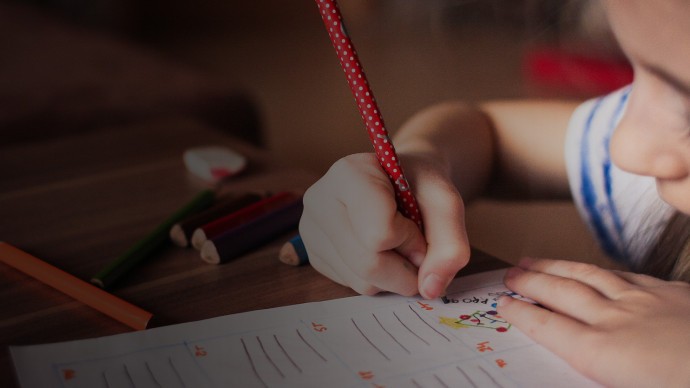
Birth to three: The Odd Project
Researchers at Manchester Met are helping to transform the education of – and care for – young children, working with nurseries, schools, families, local authorities, health professionals, and arts organisations.
About birth to three
The early years are crucial to a child’s healthy development. Over two decades, researchers at Manchester Met have undertaken a collaborative programme of research providing strongly-theorised, holistic findings that have transformed the curriculum and pedagogy for this age group.
A team from the University’s Education and Social Research Institute led the programme, which included multiple projects across three strands. The first focused on replenishing the research base around Birth to Three Matters (B-3M), the pioneering framework for early years practice developed by Manchester Met researchers between 2001 and 2003. Strand two looked at two-year-olds in the nursery, and strand three explored under-threes in museums and galleries.
Fleshing out the theory
The original B-3M research identified four aspects of successful early childhood practice: a strong child, a skillful communicator, a competent learner, and a healthy child. Subsequent projects have fleshed out the holistic theory underlying these aspects, with findings on embodiment and sensory experience, and sense of place.
One of these projects focused on mental health and wellbeing — Odd: feeling different in the world of education. It was led by Rachel Holmes, Professor of Cultural Studies of Childhood. Professor Holmes contributed to the B-3M framework and leads the Children and Childhood Research Group.
This interdisciplinary research project was funded by the UK Arts and Humanities Research Council from 2018 to 2021. It built on the principles and huge legacy of the 2001-03 B-3M framework. The team worked with the whole community of a primary school in Manchester, including the pupils, staff and parents.
Easing daily struggles
According to the 2021 Health and Social Care Committee report Children and Young People’s Mental Health, NHS data suggests the mental health of children and young people in England has worsened since 2017. This has been exacerbated by the COVID-19 pandemic, the ubiquity of social media, peer pressure, schools’ expectations, and the drive for academic achievement and success.
Feeling different, lonely or out of place at school is reported by increasing numbers of young people with disabilities and special educational needs, by those who are in care or care leavers, by those who identify as trans or queer, and many more.
These feelings can have a detrimental impact on some young people’s mental health, while others may occupy this space more confidently. Discussing children on the autistic spectrum, for example, Judith Hebron and Neil Humphrey note how the sense of ‘difference’ experienced may trigger emotional distress. Other children often view them as ‘odd’, ‘strange’ or ‘weird’, and therefore prime candidates for bullying and teasing.
Among young people living with obsessive-compulsive disorder, researcher Carly Keyes and her colleagues found there was a strong sense of feeling ‘different’. According to Mike Stein in the 1994 report Leaving Care, nearly all the young people said they felt that they were the ‘odd one out’, and the subject of curiosity and abuse.
The Odd project aimed to help ease the daily struggles that some children face in a stifling school culture, where the pressure to conform is overwhelming. As Rachel explained: “The research was based on the idea that, despite years of inclusion and intervention strategies, schools are still hostile places for some young children.
“We looked at lots of different sources and found many parents expressing their concerns, saying things like my child doesn’t fit in; they feel lonely, don’t have any friends; she feels like the teacher doesn’t really like her; the system doesn’t support what he needs; he’s been expelled or withdrawn from school. It seemed that lots of children still felt very isolated and alienated.”
An experimental approach
The research came out of the team’s concern for those young people who see themselves as — or are made to feel — illegitimate in the world of education. From an ethical perspective, they recognised the need to tackle the idea of ‘difference’ in an innovative way, exploring how oddness takes form in schools. More specifically where they might find oddness, and how it feels, smells, looks, tastes and sounds, as well as how children notice and respond to it.
“We all feel different and peculiar at different times in our lives,” Rachel said. “What does that feel like? What does it make us think, feel, do?”
Sometimes the sounds of the radiator and the heating system were an odd thing.
The project team included educational researchers, artists and a visual anthropologist. They soon realised that more traditional qualitative research methods would not be enough to tune into how young people think and learn with their bodies, including capacities and habits, their bodily knowledge and experiences of school. To do this the team developed an experimental research design that used different techniques to get under the skin of the school.
Amanda Ravetz, the visual anthropologist, took up the position of the child. “She was using, in some ways, a traditional ethnographic practice of going somewhere and getting to know the culture, people and routines,” Rachel said. “She wore a school uniform and put herself physically in the position of a child. She was trying to attune to the experiences of a nursery child – what was it like to be there?”
Becky Shaw, one of the artists, used more sensory methods that involved the children, for example using a stethoscope to listen to what was going on behind walls or in the cellars, or an endoscopic camera to go down grids in the playground and bathroom plug holes. Together with Jo Ray, another of the project’s artists, she also established an Odd After School Club as a new place and time to reflect with children on how the ‘usual’ place and time of school feels. This built an environment where relationships, behaviour and activities were less hierarchical.
Rachel said: “They were interested in how it feels for children to be in school, for example, which parts of the playground and corridors felt uncomfortable? One corridor, for example, was particularly cold. Nobody knew why – the radiators were working, but the children all knew it as the cold corridor. And that made some feel quite nervous.
“The toilets were particularly interesting. One girl was very nervous and preferred not to use them,” Rachel said. “Smell was another significant aspect of school life for some children – for some, the dining room and the toilets were difficult places because of their smells. Sometimes the sounds of the radiator and the heating system were an odd thing. We got to know the school in a different way, beyond the human aspects.”
We want to think of inclusion that refuses the spaces, pace and practices of ‘normalcy’.
Steve Pool, an artist, and the educational researcher Kate Pahl made films with children about their odd dreams and other odd stories. They explored how children imagined school to be, what scared them, what they liked about it, and what was odd about it.
The team worked closely with staff and, where they could, with parents to make sure their voices came through. They also collaborated with educational psychologists to think through the implications of the research.
Re-imagining inclusion
In June 2022, the team will collaborate with a team of educational psychologists from Catalyst Psychology to hold a conference that showcases some of the research. Approximately 100 attendees will include educational psychologists, special educational needs and disabilities coordinators, teachers, and student educational psychologists.
The conference is called Struggles With And For Identity: Insights From Research And Experiences. It focuses on the struggles that we all have in school to find out who we are and how to belong. It also explores how we negotiate these difficult things in the early and later years, in school and beyond.
“We want to work with the conference attendees to develop a new manifesto of inclusion in schools,” Rachel said. “One view of inclusion is that it’s about remedial action or rehabilitation: it encourages children to fit into a very rigid system that has narrow parameters denoting what is and isn’t deemed ‘normal’.
“So, a child struggling to conform to classroom rules, such as putting their hand up to answer a question rather than shouting out, will be given a card with visual cues to prompt the desired behaviour. Or a child who can’t sit still will be given a cuddly toy to hold, motivating them to comply and sit quietly. It’s trying to encourage all children to achieve a sense of normality.”
“We want to think of inclusion that refuses the spaces, pace and practices of ‘normalcy’ such as neurotypicality, heteronormativity, and chrononormativity. Instead, we want to find out what inclusion might look like if we affirm rather than elide differences. We hope that this manifesto will translate into policy.”
We all feel different and peculiar at different times in our lives. What does that feel like? What does it make us think, feel, do?
Drawing insights
Several situational insights were drawn from the project, including the importance of movement in schools, which is central to learning.
Rachel said: “Drawing on somatic and movement studies, we attuned to children’s propensity to fidget, slide or tap. We were interested in how children experience school as a place where different kinds, speeds and scales of movement matter. While one child’s movements might be irritating, distracting, disruptive or confounding to other children or the teacher, that does not mean they need to be made more docile, rehabilitated.”
The researchers found that the senses are critical in school, but some are overlooked. “Sight is important in school and so is hearing. But we discovered that taste, smell and touch are equally important in the learning process and critical to feeling like you fit in.”
The research discovered that children on the periphery of the playground and friendship groups find different ways of connecting to school life through their environment.
“They have relationships with lots of other things in school that intrigue and inspire them, and about which they are curious,” Rachel said. “They might seem to be on the outside of friendship groups, but they are moving in and out of lots of different relationships and connections with the school and its community, the building itself and the grounds outside. One boy, for example, was fascinated by a mud patch. He spent time with his bug companions and this place in school was where he said he belonged and had friends.”
The research has foregrounded how sensation, feelings, movement and place play a vital role in early — and later — development. The Odd Project’s research collective has developed new forms of co-produced research and collaboration, bringing theory and practice together by working and researching with different combinations of researchers, practitioners, organisations, parents and doctoral students.
In the coming months and years, there is no doubt that this work will continue to play a crucial role in transforming the education of and care for often marginalised young children.
Project collaborators

Manchester Metropolitan University

Arts & Humanities Research Council

Alma Park Primary School

Sheffield Hallam University

Catalyst Psychology

National Children's Bureau

Anti-Bullying Alliance
Lead academic and research group
Lead researcher
-
Our commitment to breaking new ground is crucial in seeking imaginative ways of developing different futures for the child, young person and her family.
Professor Rachel Holmes



